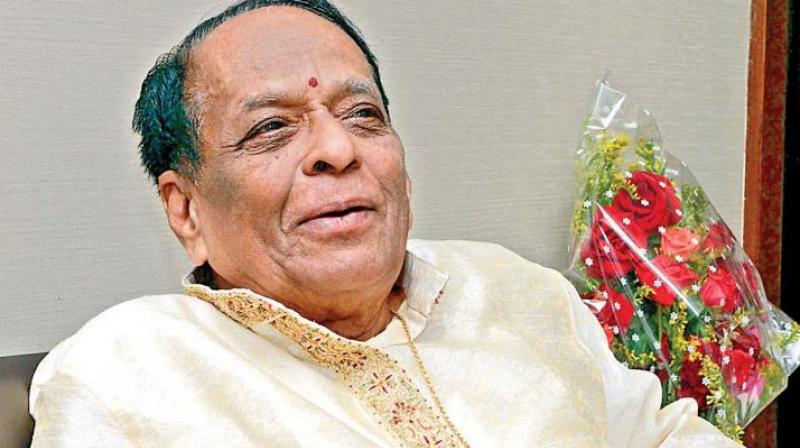Maestro tries to cure with music therapy
Use of notes to bring relief brought Balamuralikrishna in close contact with doctors.

HYDERABAD: In the early 1980s, M. Balamuralikrishna was convinced that music was medicine for the body. “He tried to use music to help treat MGR. The experiment later stopped due to unexplained reasons,” said Dr J. Srikanth, a senior physician with the Apollo Hospital, Hyderabad. Music therapy, or the use of certain notes, to bring relief to patients at different stages of illness, was a pursuit that brought Balamu-ralikrishna in close contact with several doctors from across the country.
Dr Sirkazhi Sivachidam-baram, a well-known vocalist from Chennai, said it was Balamuralikrishna who inspired him to look into music as therapy. “My father (Sirkazhi Govindarajan) and he were good friends. And after came to know that I was a student of medicine, he urged me to carry out further research in the field. It is believed that hymns by Appar, Sundarar, Gnanasambandar and Manikavasagar (Shaivite saints from the 7th century) had the power to cure ailments.”
Dr Sivachidambaram said, “Music therapy has been around for ages, because only musicians can make an audience sit in their seats, forgetting all forms of discomfort, for three to four hours. Kutcheris can be called mass therapy sessions which have a wholesome impact on the body and mind. It was Dr Balamuralikrishna who pioneered the concept of music therapy based on the ragas. We now use music as adjunct therapy — building on the main treatment strategy. Patients with chronic ailments are made to listen to music of their choice and this helps to divert the pain.”
Pain relief is a major aspect of music therapy. Dr T. Mythili, a cognitive neuro psychologist and music therapist, was part of an early team of doctors at Chennai’s Apollo Hospital who worked with the late singer on music therapy. “He knew the importance of music. That’s how he inspired us to heal patients using music. Medicines are administered orally, injected into the veins or the muscles. Music has a more direct experience on the brain and body. It calms the patients. Also, when patients are told that they will regain consciousness within 36 hours of surgery, those who have undergone music therapy have been known to wake up in the 35th hour. Such is the impact,” said Dr Mythili, who has also written a book on the subject ‘The power of music’.
“We use only Carnatic instrumental music for therapy as we have noticed the frequencies of the notes have a certain impact on the human mind. Deep research into the subject has also shown that pregnant women who were exposed music therapy ended up having more intelligent children. And when it comes to pain relief, music has a profound impact on the body’s pain receptors... boosting the influence of pain relief drugs,” said Dr Mythili, a disciple of Balamurali-krishna since 1977.
“His passing is a huge loss to music. But we must be proud that we knew him in our lifetimes. That we were able to see him, meet him, be with him and hear him perform. His memory is filled with some of the best music this country has churned out and for that alone, we are all grateful and proud.”

